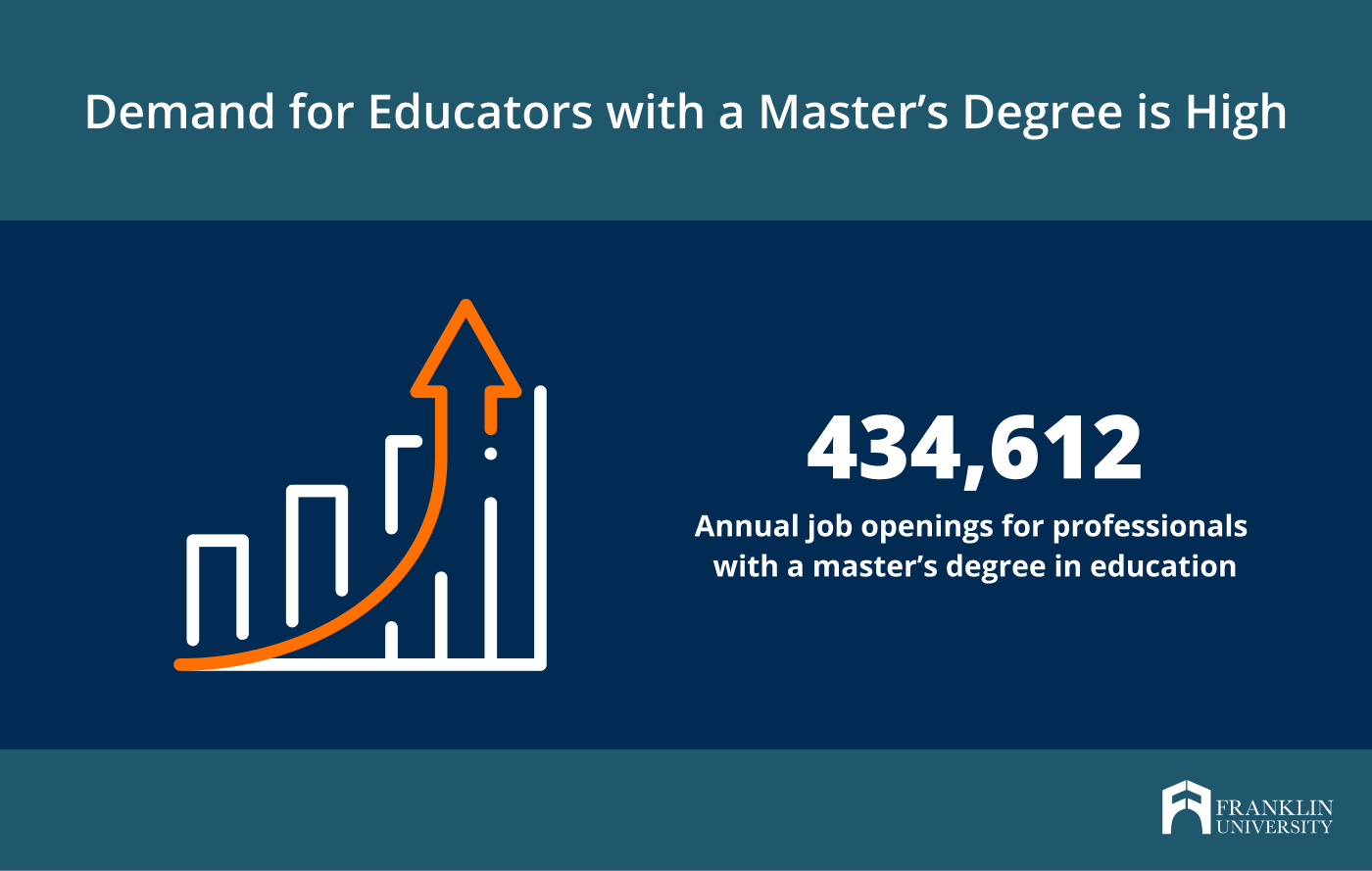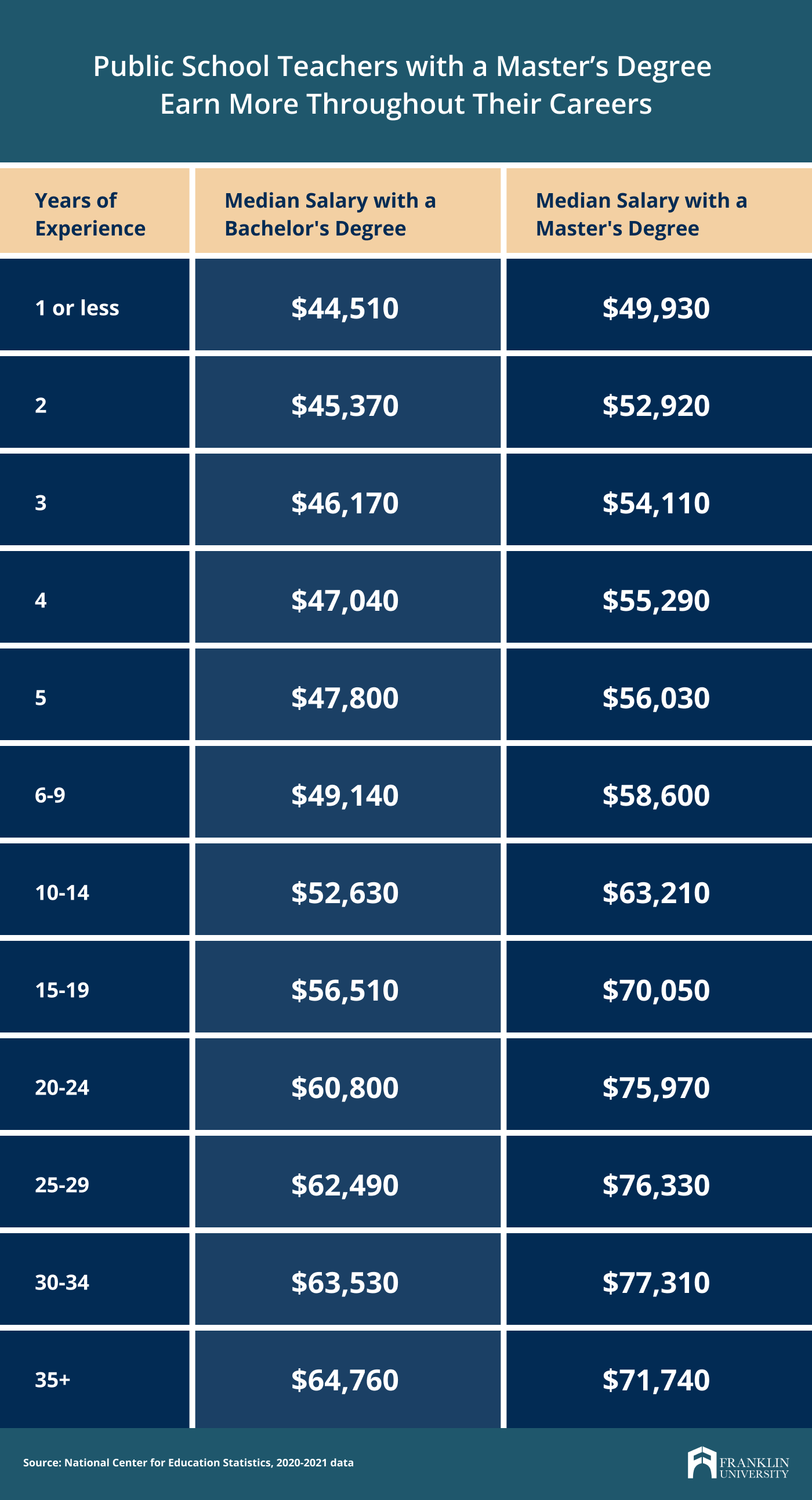Request Information
We're Sorry
There was an unexpected error with the form (your web browser was unable to retrieve some required data from our servers). This kind of error may occur if you have temporarily lost your internet connection. If you're able to verify that your internet connection is stable and the error persists, the Franklin University Help Desk is available to assist you at helpdesk@franklin.edu, 614.947.6682 (local), or 1.866.435.7006 (toll free).
Just a moment while we process your submission.

Is a Master's in Education Worth It?
Educators play a vital role in our lives and communities, yet professionals in the field remain notoriously underpaid.
Though systemic change is needed, it is slow. In the meantime, one way individual educators can earn higher salaries is to attain additional education. A Master of Education (M.Ed.) degree can lead to increased pay for professionals in the classroom and those who wish to move into administrative roles or alternative positions. But calculating the return on investment of a master’s degree requires careful consideration of a number of factors. Here’s what you need to know.

What is a Master of Education?
A Master of Education (M.Ed.) is a graduate degree designed for teachers, administrators and other professionals working in education and adjacent fields.
The content and focus of an M.Ed. degree can vary by school, but these practical degrees usually apply theory to real-world situations relevant to teachers and education leaders. Many M.Ed. programs offer specific focuses in areas ranging from school leadership to educational technology. Franklin University’s M.Ed. in Educational Leadership offers focus areas in K-12 Building-Level Leadership and Higher Education Leadership.
Get a FREE education career action plan filled with resources and recommendations from those who are already there.
What are the Benefits of a Master of Education?
A Master of Education is a versatile degree that can be applied inside and outside the classroom to positions as educators, school and district administrators and teacher leaders. An M.Ed. can help you develop concrete leadership capabilities and prepare to take on the myriad challenges that face the education field today. It is also valuable outside of the school system in roles such as corporate training and development and instructional design.
“If you are seeking to be a leader or increase your leadership with a focus on education, the M.Ed. is the gold standard,” says Dr. Patrick Bennett, vice president of academic quality and dean of Franklin’s School of Education.
Since the degree offers an entry point into many leadership positions, earning this degree is one way to access higher salaries and advance your career over time.
How Much Does a Master of Education Cost?
The cost of an M.Ed. varies between schools and online and in-person programs, ranging by as much as tens of thousands of dollars. Unfortunately, complicated tuition structures and hidden fees quickly drive up the price of many degrees, so be sure to seek out details as you compare programs. It’s also important to consider the opportunity cost of lost wages. Some programs are not designed for working professionals, meaning that you won’t bring in your usual salary while you study.
That said, a Master of Education degree doesn’t have to break the bank. Franklin University’s M.Ed. costs less than $25,000 total, and all new students are eligible for an automatic $2,000 scholarship. Since the program is designed for working adults, you won’t have to give up your career progression or salary. Your tuition rate is locked in as long as you remain an active student, meaning you don’t have to worry about increases, and Franklin uses a transparent pricing structure to avoid surprises.
What Can You Do with a Master of Education?
A Master of Education prepares students for many in-demand careers. Potential paths include:
Elementary, middle school, or high school teacher
- Median advertised salary: $60,000
While most states don’t require public school teachers to hold a graduate degree, in most districts holding an M.Ed. will move you into a higher pay bracket. If you choose to teach at the elementary school level, you will likely teach students at a particular grade level. At the middle and high school levels, you might choose to teach a single subject like English or math. Special education teachers are also in high demand at all levels.
Curriculum director
- Median advertised salary: $99,100
Curriculum directors create curricula in keeping with local, state and federal education standards and work with teachers to ensure its effective implementation. They also continually assess student progress to identify areas for improvement.
Director of special education
- Median advertised salary: $108,300
Special education directors may work at the school, district or even state level to set policy and practices for special education programs, ensure compliance with relevant laws and support special education teachers.
School principal
- Median advertised salary: $104,700
Principals may work at the elementary, middle or high school level to set the school’s direction, work with district leadership and create a positive environment for students, teachers and staff. To become a principal, you will need a school administrator certification in your state. Requirements and processes for earning this credential vary.

Is a Master of Education Right for You?
An M.Ed. degree offers an exciting chance to deepen your knowledge and skills and to advance in your career. It can also lead to financial payoffs. Most school districts tie pay rates to education levels, meaning that a teacher with a master’s degree will earn a higher salary throughout their career than a peer with equivalent experience but only a bachelor’s degree. In fact, some teachers may recoup the cost of their master’s degree within just a few years.
Plus, holding a graduate degree may qualify you for higher-level positions that come with increased salaries, like principal or curriculum developer positions. Ultimately, however, the choice to get a master’s is deeply personal.
Make the Most of Your Education Career
Earning an M.Ed. isn’t just a financial investment – it also requires a significant commitment of time and energy. Franklin’s M.Ed. in Educational Leadership program is designed with working educators in mind and is offered 100% online with the flexible schedule you need. You can finish your degree in as few as 12 months while receiving personalized support from faculty and emerge prepared to take on new challenges and grow your career.
Find out how an M.Ed. in Educational Leadership from Franklin can help you take your next steps.





